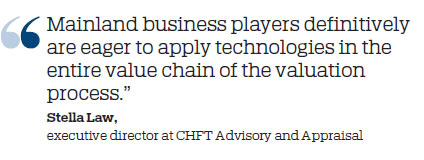A matchmaker across borders
Updated: 2019-03-15 07:53
(HK Edition)
|
|||||||
Artificial intelligence and big data analytics stand to transform the entire value chain of global trade and logistics. Now, with big data and AI technologies in full gear, they can even be applied in business asset valuations. In the second part of our series, Oswald Chan tells how the technologies can affect the type and quality of economic growth.
International trade has been traditionally dominated by big players, with small and medium-sized enterprises squeezed into a corner. SMEs in every country would like to explore overseas consumption markets to lift their businesses to new heights. Overseas vendors also want to tap the reciprocal consumption markets.
AI-enabled digital platforms now provide an unprecedented opportunity for small businesses to go global. Besides AI-powered translation services, which reduce errors in trade documents, the technology could also be used to improve outcomes from international trade negotiations.
A witness to the growing application of big data technologies in trade and logistics, Wang Ying and other business partners set up KKS in 2016 with a vision to make global trade more convenient and efficient by building a one-stop cross-border factory-to-business procurement platform.
KKS' proprietary big data technology provides the matching platform to link overseas suppliers and domestic vendors, with both as its potential clients.
Harnessing big data technologies, KKS integrates all consumer goods information to formulate a data bank. The startup then furnishes price quotes to clients based on the data bank. Domestic SMEs and overseas vendors can sort out what they need from each other from the price quotes provided by KKS.
The startup also develops its proprietary AI-enabled chatbox platform for customers to source their supplies intelligently.

The KKS technology platform cooperates with various service providers in the entire cross-border trade supply chain and links domestic SMEs and overseas purchasers in a one-stop service mode in kicking off negotiations, signing contracts, sourcing procurements, arranging logistics and customs clearances, as well as making payments. Hence, domestic SMEs and overseas vendors can overcome various hurdles in cross-border trade, such as language, law, procurement, logistics, and supply chain finance.
The KKS platform currently attracts 2,000 overseas vendors, offering more than 120,000 sets of consumer goods information. Some 4,000 SMEs - mostly from the Chinese mainland - are its customers.
Luring overseas vendors
The startup will continue to add and update its product data base, and expects 500,000 sets of consumer goods information to be added to the data base by the second quarter of this year. It will lure more overseas vendors to join the platform to make business matching more reliable.
KKS has offices in Shanghai and the United States manned by 15 staff. It had raised 13 million yuan ($2 million) in two funding rounds and aims to raise a further 20 million yuan this year. The proceeds will be used to elevate technology standards, recruit customer services representatives with in-depth knowledge of big data technologies, and attract more overseas buyers to the company's platform.
"The KKS model can be an example of how mainland technology enterprises are making strides in exporting electronic business services to other countries," Wang told China Daily.
To better serve Hong Kong vendors, KKS is mulling establishing a branch office in the special administrative region this year though local vendors currently make up just 1 to 2 percent of the clients on its platform. It's also looking at options to get more Hong Kong-based suppliers on board.
"Hong Kong's retail landscape still hinges very much on brick-and-mortar shopping malls. The development of e-commerce is still slow here," said KKS Product Director Qian Xin.
"KKS's main job this year is to encourage more Hong Kong-based vendors to switch to the e-commerce mode so that they can be better represented in electronic cross-border trade."
"This is also in line with the aim of promoting more overseas imports into the Chinese mainland's consumer market," said Qian.
The logistics industry is closely aligned with cross-border trade. The sector is a perfect example of how applying AI and big data technologies can slash costs and raise efficiency. It is labor-intensive, as transportation, warehousing and delivery all require a large number of workers to carry out simple and repetitive tasks.
According to economic research firm Wind, logistics costs accounted for 11.7 percent of the world's gross domestic product in 2017.
As global supply chains become increasingly complex, end-to-end visibility has become a prerequisite to ensure stability and reliability in any supply chain. Customers need greater visibility and control to improve the quality of their operations, exception management, and demand planning at lower operating costs.
Last month, Hong Kong-listed Kerry Logistics Network launched KerrierVision, a sensor-based logistics solution, to monitor cargo across sea, air, and ground transportation round-the-clock. The device, which is accepted in over 190 countries, transmits seamless data on location and environmental variables, including temperature, pressure, tilt, shock, humidity, and pilferage to multiple stakeholders along the supply chain.
The sensor-based logistics solution is particularly useful for time- and environment-sensitive shipments, such as those in the healthcare and pharmaceutical sectors. It also adds value to premium goods, including consumer electronic products. Both consignees and shippers can obtain first-hand information on the physical environment of the cargo through personal alerts and the KerrierVision portal.
Hence, customers can make immediate decisions at any stage across the supply chain based on intelligence, which helps them minimize losses and boost efficiency.
The McKinsey Global Institute estimates that AI could potentially deliver additional economic output of around $13 trillion by 2030, lifting the world GDP by up to 1.2 percent a year.
While AI is likely to eliminate repetitive jobs like those of after-sales staff and truck drivers, the technology still cannot replace tasks requiring creativity, compression, professional skills and leadership, such as those by artists and scientists, medical caregivers and kindergarten teachers, as well as chief executive officers.
In addition, AI adoption will create new jobs for software developers and engineers, as well as supervisory staff for monitoring, licensing and repairing machines.
Apart from facilitating cross-border trade and logistics activities, big data technology is also being exploited in the valuation industry.
Data standardization is a major gridlock in all types of business valuations like real estate, business equity, infrastructure, plant and machinery, as well as other asset classes. The valuation process is time-consuming and inefficient and requires heavy manual labor inputs. The process is also lengthy which normally takes up to five business days to obtain a valuation report.
CHFT Advisory and Appraisal has teamed up with Agility Partners - the real-estate consultancy arm of Singapore-based PhillipCapital Group - to develop the Automated Valuation Model (AVM) to provide big data/AI-enabled tools for streamlining asset valuations.
The valuation company's proprietary AI and big data-powered technologies support algorithms to compare valuations from multiple and varied sources at a single point in time and then provide an accurate appraisal.
In residential property asset valuation, with data such as the location, the size of apartments, transaction history and other evaluation criteria, a digital property valuation report will be generated.
The digital valuation report can then alert mortgage loan lenders and homeowners based on two different scenarios. If residential home prices plummet, the report would act as an alarm bell for banks to tighten risk management measures. If prices climb, the report can become a catalyst for homeowners to decide whether or not to seek refinancing as their asset values go up.
Besides residential units, the AVM can be applied to other property segments, such as development sites, office buildings, shopping malls, car parks, logistics premises, hotels and other specialized properties. Among various property sectors, CHFT expects the AVM to be applied to commercial buildings in the second half of this year.
The AVM has been adopted by Singaporean lenders, while some home valuation services in Malaysia and Indonesia are based on AVM projections.
Rollout in Bay Area
Hong Kong-based banks are expected to harness this new valuation technology this year. Starting from Hong Kong, CHFT expects the technology to be gradually rolled out in the Guangdong-Hong Kong-Macao Greater Bay Area, South Korea and Japan.
Commercial banks with mortgage loan services could also adopt the AVM. Insurance companies, private developers, management companies of real-estate investment trusts, and homeowners with a multitude of property assets are potential buyers of the AVM services.
Listed companies can also utilize the AVM technique to determine the values of their property portfolios when this set of data is included in their annual financial statements.
CHFT may utilize application programming interfaces (API) this year to gain more data sources to apply the AVM in conducting valuations of different asset classes. However, data standardization presents a challenge for valuation professionals since data presentation in business valuation is still not standardized.
Stella Law, executive director at CHFT, says companies adopting the AVM are expected to reap huge benefits.
"After adopting the AVM, only three staff will be required, compared to 10 who are needed to perform manual job duties, thus helping to slash operating costs tremendously for commercial banks in conducting mortgage loan businesses," she said.
"In addition, commercial banks can capitalize on this valuation technique to make more mortgage businesses."
The AVM is also vital for the transformation of the appraisal and valuation industry as valuation professionals can leverage the tool to maximize their business values in the market, Law said.
Commercial banks and property developers on the Chinese mainland are also expected to benefit from the AVM adoption. Commercial lenders need to refresh their valuation systems to expand the mortgage loan business. Property developers require business projections provided by the AVM to decide on property development strategies and pricing of property assets.
"Mainland business players definitively are eager to apply technologies in the entire value chain of the valuation process. Though Hong Kong-based market players may not be eager to embrace the technology at this stage, mainland developers are in a position to adopt the AVM," Law said.
Contact the writer at
oswald@chinadailyhk.com

(HK Edition 03/15/2019 page12)